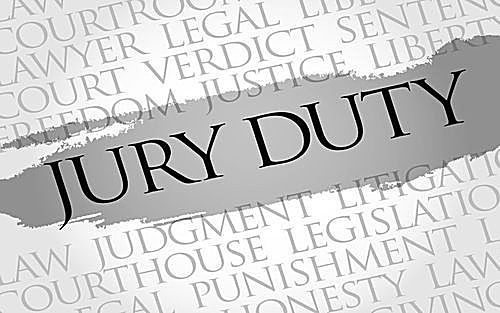From time to time, I will get a call from a friend or family member stating that they just got a jury duty notice, and they are wondering how they can “get out of it.” My response is always the same: you can’t get “out of it,” but that does not mean you will actually have to serve. First, let me give some background of how the system works.
Jury Pool
The North Dakota Legislature declared in adopting the law governing jury pool selection that persons selected for jury service be selected at random from a fair cross-section of the population of the area served by the court. Further, the Legislature requires that once someone has been summoned for jury duty, that they have an obligation to serve. Further, N.D.C.C. 27.09.1-10 states that no qualified juror is exempt from jury service.
So what happens if you get summoned and have a vacation planned or your wife is scheduled for surgery that day? Section 27-09.1-11 N.D.C.C. 27-09.1-11 deals specifically with excuses from jury service. The Court (upon request from a prospective juror on its own initiative) can review the information as to why the prospective juror feels he/she needs to be excused and make a determination as to whether or not that potential juror will be excused from service. The Court is also able to stay the jury service summons for a time period it deems necessary if the prospective juror can show undue hardship, extreme inconvenience, or public necessity.
If I have a friend or family member who calls and says that they can’t serve that week because they have a vacation, or are scheduled for surgery or something similar, I often tell them to call the Clerk of Court’s Office to let them know. The Clerks are usually very helpful in those types of situations. It does not mean you will never have to serve, but it can be put off a lot of times until your hardship has passed. Simply Google your County Clerk of Court to find contact information.
Jury Trial
If you receive a jury summons, that means there is a jury trial scheduled in the District Court that you have been selected to serve as a prospective juror amongst a pool of other prospective jurors. Just because you get a jury summons, that does not mean you are serving on a criminal case, as civil cases go to trial as well. But what is the difference between the two?
In civil cases (i.e. a car accident, slip and fall, medical malpractice, or general negligence or personal injury action to name a few), a jury trial can be requested by either party, and that jury can range from 6 to 9 jurors. N.D.C.C. 28-14-03.1 states that in civil cases where a jury is impaneled (which first has to be requested), that jury must consist of 6 qualified jurors unless a party makes a timely request for 9 jurors.
In criminal cases, the number of jurors depends on what type of charge is pending for trial. N.D.C.C. 29-17-12 states that for all felony cases, the jury must consist of 12 jurors. This goes on to state that in Class A misdemeanor cases, the jury must consist of 6 jurors, but if the defendant makes a timely written demand for 12 jurors, then it will be a 12 person jury. In all other misdemeanor cases though, the jury must consist of 6 jurors.
What does this mean? It means that if you have received a jury summons and it is a civil case, you would have to be one of the 6 to 9 jurors that would have to be finally selected during jury selection to have to serve as a juror on the trial. If you have received a jury summons and it is a criminal case, you would have to be one of the 6 to 12 jurors that would have to be finally selected during jury selection to have to serve as a juror on the trial.
Jury Selection
So, the big day is approaching for you to find out whether or not you are going to get to serve as a juror. The jury summons you received likely tells you to call the night before the scheduled trial date to find out if the trial is still going forward or not. A lot of times, when that call is made, you find out that the trial is not going forward. More than likely, that is because the case settled just prior to trial, or there was a last minute issue that required that the trial be continued. But if you make the call and they tell you to report in the morning, what happens then?
When you arrive at the Courthouse, you (like everyone else) will have to go through security. That means that you will be subject to search, so make sure you don’t bring anything to the Courthouse you would not bring to an airport.
After you get through security, you will check in and likely be placed in a room with other prospective jurors. That is not to say that everyone in that room will be a prospective juror on the trial you may have to serve on, as there may be multiple trials going on in that Courthouse on that one day. After some time has passed (and it could be a long time, as the parties and Judge may have pretrial issues to work out before jury selection), you will be led into the courtroom.
Once in the courtroom, you will see the Judge and his/her clerk, reporter and staff. Also, you will see the parties and their attorneys sitting at counsel table. Depending on the courtroom, you will likely be sat in the back of the Courtroom in the seating for people who come watch trials, until called up to the juror box. Each Judge runs jury selection differently, but in general, most Judges will have a group of names called up to sit in the jury box, with the rest of the remaining jurors to remain seated in the back of the courtroom. The number of people called up to the jury box for selection will amount to the number of jurors needed for service on the final jury, plus the number of peremptory challenges to be exercised in the case (discussed below). Some Judges prefer to also seat alternate jurors, in case something happens to a juror in their life during the trial that prohibits them from continuing on in their service. If that is the case, the number of alternate jurors the Court wants will also be loaded in the box for jury selection.
What happens next is a process called “voir dire,” which is simply the Court’s and parties’ attorneys opportunity to ask questions of the prospective jurors to determine if the juror is fit to serve, needs to be stricken for cause, or if it is a juror that a party simply wants to use a peremptory challenge. So let me break that down a little more.
There are certain disqualifying events for a juror that the Court would automatically excuse a potential juror – (1) are not a citizen of the United States, (2) are not residents of the state and county where the trial is taking place, (3) are not at least 18 years old, (4) are not able without reasonable accommodation to communicate and understand the English language, (5) are not capable by reason of physical or mental disability and with reasonable accommodation of rendering satisfactory jury service (this may require proof from the physician), and (6) have lost the right to vote because of imprisonment in the penitentiary or conviction of a criminal offense that disqualifies that person from jury service. If someone is excused for one of these reasons, a new prospective juror will be called up to sit in the jury box for voir dire with the others already there.
The Judge can decide to excuse a prospective juror for cause without a party asking for the Judge to do so. Depending on how the Judge runs his/her courtroom, each party will have unlimited challenges for cause. For instance, if I am trying a medical malpractice case, and one of the jurors works for the same hospital I am suing, I may challenge them for cause. After I make that challenge, the other side may have the ability to ask some questions, and the Judge will likely have some questions about whether or not that prospective juror could still serve objectively and without bias. After that is done, the Judge will decide if that person should be excused or not from service. If someone is excused for one of these reasons, a new prospective juror will be called up to sit in the jury box for voir dire with the others already there. For more reading on challenges for cause for criminal cases you can refer to Rule 24 of the North Dakota Rules of Criminal Procedure, and for civil cases, you can refer to Rule 47 of the North Dakota Rules of Civil Procedure.
Then there are peremptory challenges. The rules provide for a certain number of peremptory challenges to each party, which allows them to strike a juror from service. Rule 24 of the North Dakota Rules of Criminal Procedure governs peremptory challenges in criminal cases, and provides for 4 peremptory challenges for each side when a 6 person jury is to be impaneled, 6 peremptory challenges for each side when a 12 person jury is to be impaneled, unless it is an AA Felony charge, then each side gets 10 peremptory challenges. Also, in criminal cases where there is more than one defendant, the Court may allow the defendants additional peremptory challenges and allow them to exercise the challenges together or separately. In civil cases, Rule 47 of the North Dakota Rules of Civil Procedure provides that each side is entitled to four peremptory challenges regardless of the number of parties on each side. For instance, if there are 4 separate defendants in a civil case, the defendants collectively will still only get 4 peremptory challenges. In civil cases, the Plaintiff is always the party who starts with their first peremptory challenge, and then it alternates between the parties on their choices until all are spent.
Most often that party feels that the juror may not be someone who may not be sympathetic to their client’s case or defense. Once all peremptory challenges have been exhausted, if you are still sitting in the jury box, congratulations, you are now a juror! If you were not selected and are still sitting in the back of the courtroom, however, you get to go home!
Public Service
Jury Duty is a public service, but there is no doubt that it is an inconvenience to someone’s life. Attorneys and Judges realize that which is why we truly appreciate each and every person who sits on a jury for any trial we handle. While it may not seem like it when you receive the jury summons, if you do get the chance to serve on a jury, I hope you find it to be a rewarding experience. Just know that without you providing that jury service, our system of justice does not work. So to all the past jurors and potential jurors who are reading this, and to all of you reading this that have no idea that you one day will be a juror or prospective juror, THANK YOU! Prior to becoming an attorney, I am not so certain I would have been excited to serve. But now that I am a trial lawyer, I would love to one day sit on a jury (which will likely never happen).
Nathan Severson is one of the trial lawyers at SW&L Attorneys. If you have questions about any personal injury case, including car accidents, slip and falls, medical malpractice, or other injuries, please feel free to reach out to Nathan Severson at 701-297-2890 or send us an email below. All initial consultations for personal injury are free of charge, and if Nathan takes on your personal injury case, they are handled on a contingency fee basis, meaning he only gets paid if you receive a settlement or win a judgment at trial.










